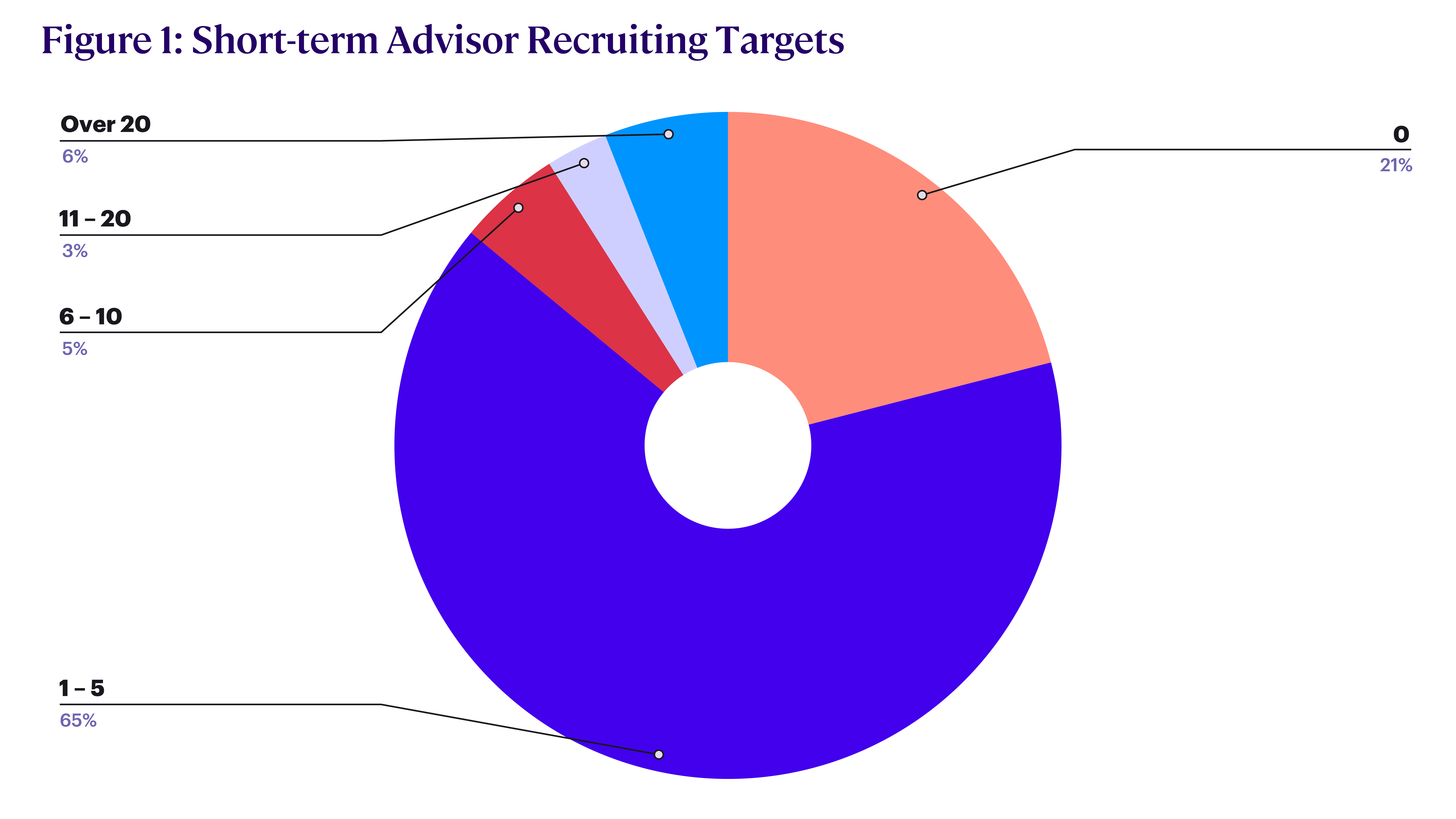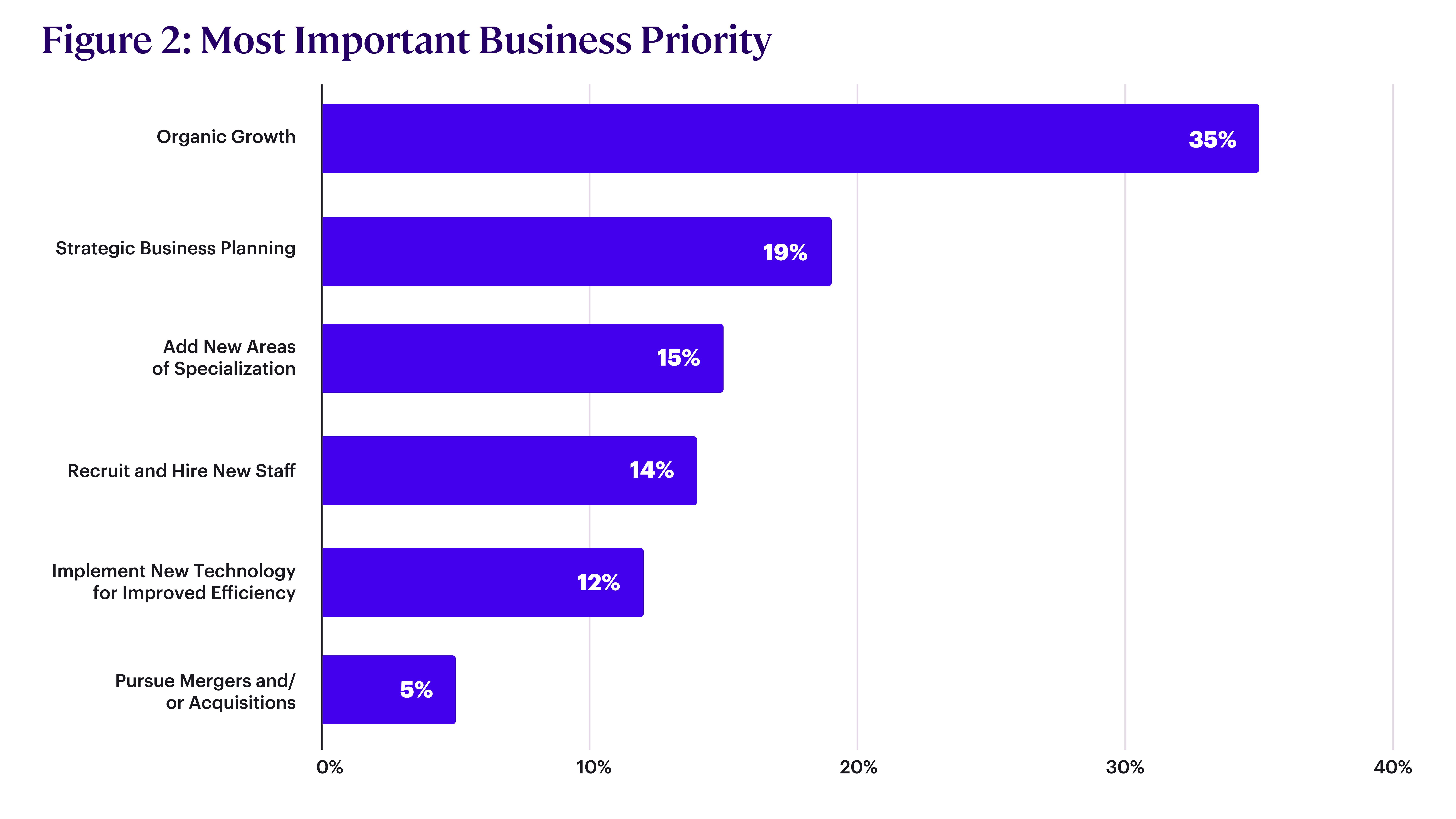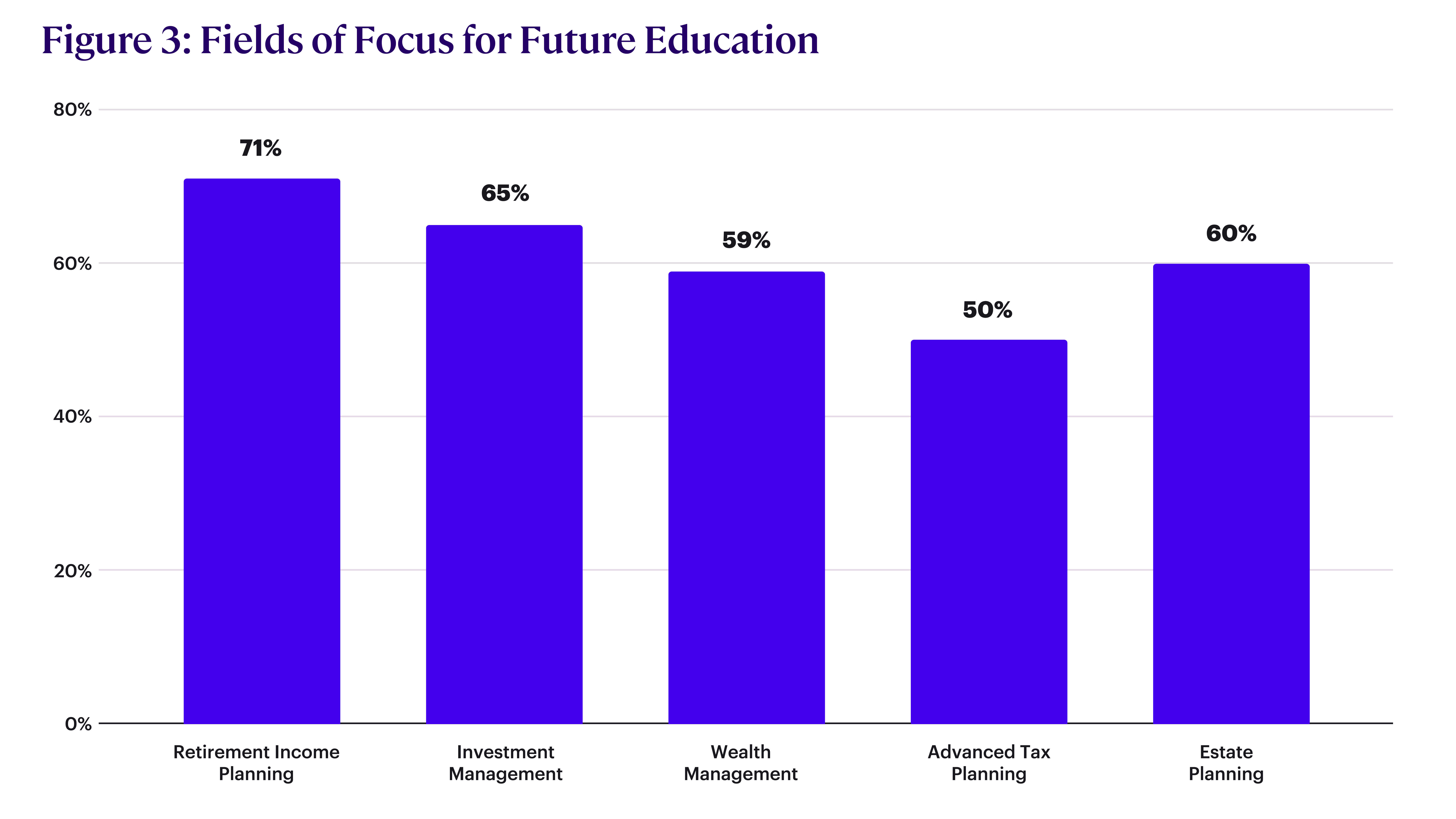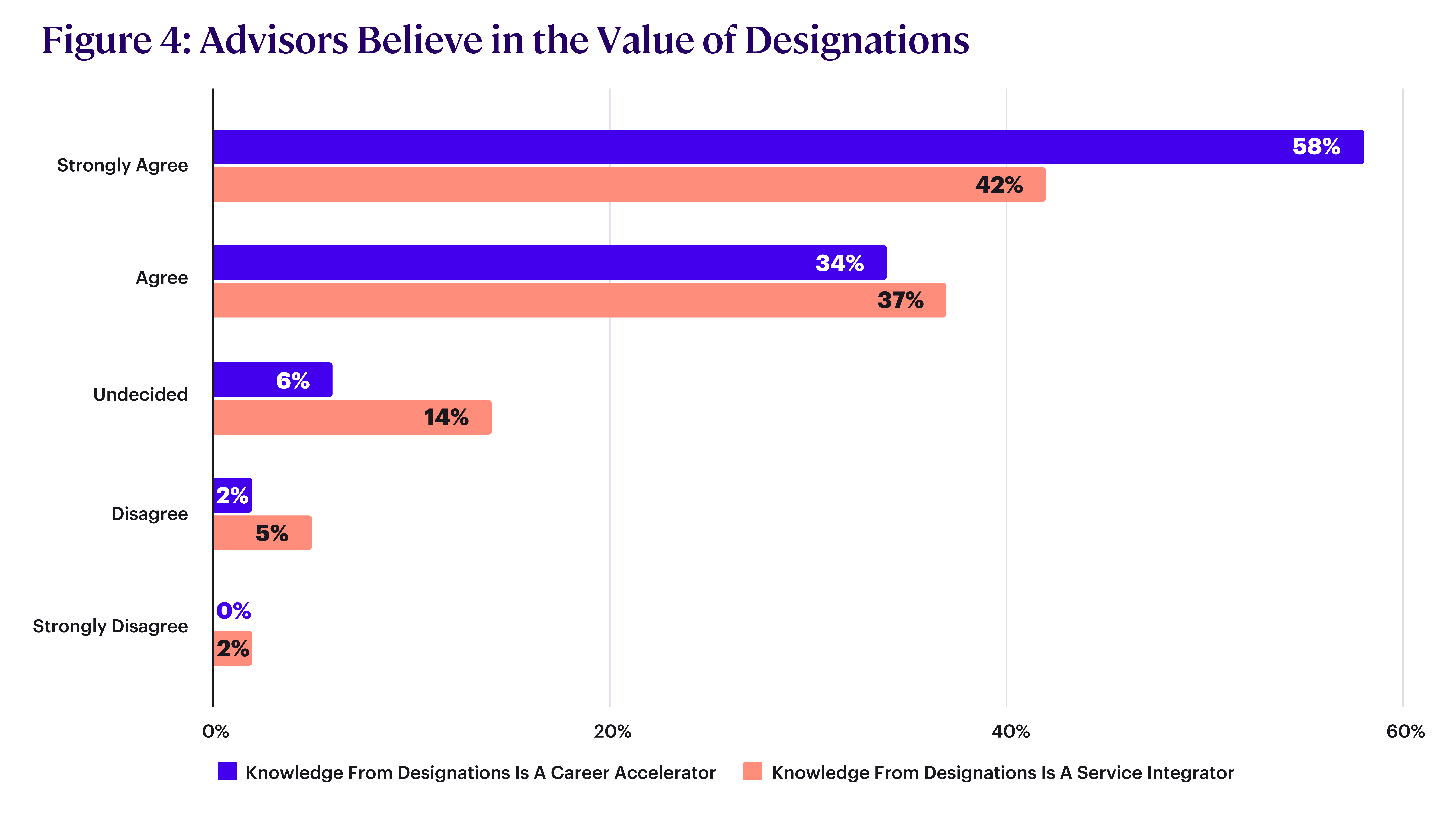Expert Panel: Today’s Retirement Plan Advisories Require Specialization
10 Reasons RIAs Should Specialize Now
What Do Clients Want from Financial Advisors?

To help advisors understand their clients better, the American College O. Alfred Granum Center for Financial Security in collaboration with faculty from the American College Cary M. Maguire Center for Ethics in Financial Services and the American College Center for Women in Financial Services conducted a national online survey of 1,157 individuals to answer some key questions. Understanding our findings may help you build better relationships with your clients.
What characteristics do people want from an advisor?
Respondents were asked to “rank the most important characteristics you would look for” when selecting a financial advisor. Here is what they said:
| Advisor Characteristics You Would Look For | #1 | #2 | #3 |
| Evidence of knowledge (education, certifications) | 27.2% | 11.7% | 10.4% |
| Trustworthy | 20.1% | 13.5% | 13.2% |
| Ability to listen to and understand your goals | 18.9% | 19.5% | 13.5% |
| Clearly communicates financial concepts | 10.8% | 7.6% | 9.5% |
| Positive recommendations by people you know | 8.0% | 12.8% | 12.9% |
| Online reviews | 4.4% | 6.8% | 7.5% |
| Values my input | 2.2% | 9.3% | 12.2% |
These results show that clients value education and certifications, as well as trustworthiness and advisors’ ability to engage with and understand clients’ goals.
What services are consumers looking for when they seek out professional advice?
Advisors need to understand the specific services that clients need. As the chart below shows, they are most interested in getting help preparing for retirement and managing investments.
We also asked if consumers seek out advisors who can evaluate investments and make portfolio recommendations, or are primarily interested in an advisor who develops a plan to meet various financial goals.
Interestingly, 52.5% primarily sought help meeting financial goals, while 47.5% felt that investment evaluation was a more valuable service. This indicates that more consumers are looking for goal-based planning services than traditional investment advice.
How important are environmental, social, and governance (ESG) factors?
We asked our respondents, “How important is it that your advisor considers the environmental and social performance of the companies you will invest in?” The answers surprised us.
Clearly, clients care about ESG. They also care about their advisors’ personal values – 53.8% said an advisor’s personal values influence their decision to do business with the financial advisor.
Did COVID change the importance of in-person advice?
The pandemic had a major impact on how advisors deliver services and many wonder how clients feel about the changes. Our findings suggest that most clients prefer a balance of online and in-person services.
When we asked our respondents, “What is your preferred form of contact with a financial advisor?” we found that:
- 52.3% prefer an initial in-person meeting followed by subsequent Zoom or telephone meetings
- 38.9% prefer in-person only
In terms of meeting frequency, a plurality of respondents felt that every 6 months was the sweet spot – although some disagreed.
Are young investors overconfident?
As advisors try to recruit new young clients, they may need to better understand how consumers’ confidence and financial knowledge levels change with age.
Financial literacy scores – measured by how many correct answers respondents provide for questions about financial concepts – increase with age. The percentage of correct answers is:
- 38.6% for those under age 30
- 42% for those in their 30s
- 45.8% for those in their 40s
- 58% for those in their 50
- 65.8% for those in their 60s
- 71.2% for those 70 and older
Despite the increase in knowledge with age, however, the percentage who indicated that they were “very confident” choosing investments fell from 40% for those under 40 to 10.2% for respondents in their 60s and just 5.3% for respondents in their 70s and older.
Bottom Line
In summary:
- Consumers want advisors who are knowledgeable, trustworthy, and good listeners.
- Saving for retirement in defined contribution plans has created a strong desire for knowledge of retirement income planning.
- Investors want their advisor to consider their ESG preferences when building an investment strategy.
- More consumers prefer to attend regular meetings with their advisor either through Zoom or a phone call, but a strong majority still prefers to be physically present for initial meetings with an advisor.
- Young investors are confident in their ability to choose investments, but also score poorly on financial literacy. This may suggest that younger investors are vulnerable to overconfidence.
Download the 2022 Granum Center for Financial Security Consumer Survey results here.
RIA Growth and Specialized Knowledge Survey Results

Nearly 80% of emerging RIAs plan on hiring over the next three years, with most looking to recruit one to five new advisors (see Figure 1).

Emerging RIAs are also concerned with broader business growth (see Figure 2).

RIAs See Value in the Right Education
Given that growth is a priority, what do RIAs see as a core pathway to achieving it? For most, it is a combination of education and specialization: Importance of further education: 76% of surveyed advisors desire further education on topics important to their clients. Value of specialization: Advisors identified retirement income planning, investment management, wealth management, advanced tax planning, and estate planning as their preferred fields of focus for future education (see Figure 3).

RIAs Accelerate Their Careers with Designations
Most advisors (92%) believe that designations have a positive impact on their careers, and 79% think that designations support further service integration (see Figure 4).

Designations, including those available in The College's ChFC®, CLU®, and RICP® Programs, are a key career accelerator for ambitious advisors and can help drive organic growth.
For more insights, download a summary of the survey now.
Financial Advisors Say Trust, Individual Effort, Specialized Knowledge Most Important Drivers of Success
The findings are part of the Advisors’ Perceptions of Success Survey conducted by the American College Center for Women in Financial Services, exploring the traits and characteristics of successful financial advisors – including the challenges they face, and strengths that led to success – to better understand the current state of advisor performance.
The study invited participating advisors to evaluate their success on a seven-point self-scoring scale – defining a continuum from low to highly successful – and asked whether advisors were meeting their business objectives to establish a means to adequately gauge levels of achievement.
Link between meeting business objectives and more success
One of the most striking findings from the research report is that meeting business and growth objectives closely correlates with being successful. In fact, only 28.4% of respondents who were not meeting objectives defined themselves as successful, while 90% of those meeting objectives were defined as successful. According to one successful female advisor, in an open-ended response: “You get out of this career what you put into this career. It’s your business. Own the success or failure.”
“Showcasing success attributes of current female practitioners can help attract more women to the business and aid them in achieving their short- and long-term career goals,” said Hilary Fiorella, executive director of the Center for Women in Financial Services. “Through this research, we sought to understand what drives advisors’ success, as it can provide valuable guidance to women (and men) considering this profession. The findings can arm firms with the insights and tools to better support the underrepresented female advisor group by understanding what success looks like as well as the unique challenges they face.”
Nearly eight in 10 of respondents who indicated they were not meeting their objectives elaborated on why in a follow-up question. Responses revealed business development (31%), the Covid-19 pandemic (17%) and systemization (16%) as the top themes for not meeting business objectives.
Nuances of success factors across genders
Interestingly, while there is a consensus among advisors at all levels on the prerequisites of success as earning trust and working hard, female respondents were more apt to credit some portion of their success to others (e.g., ability to communicate and external support received) than were men. Conversely, men emphasized individual effort more than women. Among the other findings:
- Women were more likely than men to identify interpersonal professional relationships and experiences as foundational to their career success and credited tools such as mentoring, team structure, work/life balance, and home office resources as important contributors to their success
- Men, on the other hand, more frequently referenced relationships as a reinforcement to their already-established sense of success rather than as a contributing factor to it
Challenges to success
When asked to identify the greatest challenges that could limit their ability to succeed as an advisor, respondents most frequently cited “finding new clients” (46.3%) and “hiring qualified staff” (42.6%). Male advisors slightly outpaced their female counterparts (52.8% vs. 41.8%) in terms of desire/need to find new clients, but beyond client acquisition, challenges to success tracked relatively closely by gender:
- Increasing productivity (females: 38%; males: 34%)
- Keeping next-gen clients (females: 31%; males: 30%)
- Doing more with current clients (females: 23%; males: 27%)
For more successful respondents, the most frequently cited difficulties did not vary by gender, led by hiring qualified staff (females: 53%; males: 48%), acquiring new clients (females: 38%; males: 47%) and increasing productivity (females: 37%; males: 35%).
Meanwhile, for less successful advisors, finding new clients was the most frequently cited challenge for both genders, though males reported this at a greater rate (females: 51.2%; males: 65.9%).
Support and resources desired
The survey also asked what support/resources would be most useful to advisors at this stage in their careers. Just as client acquisition was one of the top challenges identified by survey respondents, a majority said finding new clients was also first on the list of areas in which advisors want more help. Nearly six in 10 (58%) advisors cited access to high-net-worth clients as the most useful support they could receive.
Breaking this down further among female advisors:
- Half (50%) of female respondents reported access to high-net-worth clients as an area of needed support, chosen more than any other response
- Additional formal education or credentialing (43%) and technology (40%) rounded out the top three areas where support is desired among female advisors
- Study groups (37%) and mentoring (37%) rounded out the top sought after resources
Among women identifying as less successful advisors, more than half (52%) cited mentoring and study group opportunities when asked what support/resources they desired, showcasing the importance of knowledge sharing and support to enable growth and success.
“These insights highlight an opportunity for the industry to deliver the necessary resources, guidance and support advisors need to succeed,” said Kaylee Ranck, research director of the Center for Women in Financial Services. “The financial services industry has room for continued growth and expansion of professional development programs such as specialized knowledge, mentorship and study groups – primarily for female advisors – to support their individual needs on the path to success.”
STUDY METHODOLOGY
The research methodology for the Advisors’ Perceptions of Success study included a survey to assess financial advisors’ self-identified success, contributing factors to their success, and challenges faced. Respondents were asked several questions about their business models, education attainment, specializations, and personal attributes as financial advisors. Respondents answered opened ended questions adding qualitative responses supplementing the quantitative data. Information for the financial advisor success survey was gathered through an online survey tool, designed with an external research partner, with over 800 financial advisors between October and November 2021. Participants in survey were currently employed financial advisors or agents within the U.S.
ABOUT THE AMERICAN COLLEGE OF FINANCIAL SERVICES
Founded in 1927, The American College of Financial Services is the nation’s largest nonprofit educational institution devoted to financial services professionals. Holding the highest level of academic accreditation, The College has educated over 200,000 professionals across the United States through certificate, designation, and graduate degree programs. Its portfolio of applied knowledge also includes just-in-time learning and consumer financial education programs. The College’s faculty represents some of the foremost thought leaders in the financial services industry. Visit TheAmericanCollege.edu and connect with us on LinkedIn, Twitter, Instagram, Facebook, and YouTube. Discover all the ways you can expand your opportunities with us.
Practice Management On-Demand Webcasts
Women in Financial Services - Opportunities to Support Growth and Leadership
Practice Management On-Demand Webcasts